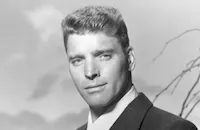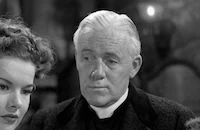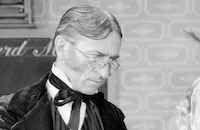I Walk Alone
Brief Synopsis
Cast & Crew
Byron Haskin
Burt Lancaster
Lizabeth Scott
Kirk Douglas
Wendell Corey
Kristine Miller
Film Details
Technical Specs

Synopsis
Ex-bootlegger Frankie Madison is released from prison after fourteen years and is met in New York City by Dave, a member of his old gang. Frankie soon learns that Noll "Dink" Turner, who ran the bootlegging racket with Frankie but never visited him in jail, now runs the respectable and upscale Regent nightclub. Hoping to manipulate Frankie into believing that they are still best friends, Noll asks his girl friend, nightclub singer Kay Lawrence, to entertain Frankie for dinner, while Noll has a rendezvous in his office with wealthy society woman Mrs. Alexis Richardson. During dinner, Frankie and Kay begin to fall in love, and he tells her about himself: In 1933, while running a truckload of rye whiskey over the Canadian border, Frankie and Noll split up to escape the police, and Noll promises Frankie fifty percent of all their earnings if he is caught. Noll then escapes on foot while Frankie, who is driving the truck, is arrested. After dinner, Frankie overhears Noll thanking Kay for getting information out of Frankie, and he angrily confronts Noll, demanding his share of the nightclub. Dave shows Frankie a dissolution of partnership paper that Frankie naïvely signed while in jail, and tells him that he is only owed $2,912. Frankie slugs Noll in the mouth and leaves to recruit men to fight him. Later, Noll tells Kay that he is going to marry Alexis, but loves Kay and wants their relationship to go unchanged. She quits and goes to apologize to Frankie, who is visited by an old gang member named Nick Palestro, who now runs a used car business. Accompanied by three henchmen, they arrive at the Regent to demand Frankie's half-ownership. Dave and Noll explain that it is owned by several corporations and that it would be impossible to give him a share without approval of the board of directors. Frankie blames Dave and threatens to kill him, then orders the henchmen to help him take over the club by force, but they refuse. Noll then has his bouncer, Dan, who also used to know Frankie, drag him into the alley in a choke-hold and beat him up. Dave later goes to the alley to tend to Frankie and apologize, promising to meet him later to discuss bringing down Noll. Kay takes Frankie to her apartment to nurse his wounds, while Dave tells Noll that he is going to ruin him by exposing his embezzlement of the nightclub's profits. Later, on Noll's orders, Dave is gunned down in the street by a henchman named Skinner and Frankie is wanted for the murder. He and Kay escape in a taxi provided by Nick to Noll's New Jersey home, where he is waiting for them with a gun. Frankie easily outwits Noll, gets the gun, and takes him at gunpoint to the Regent, where he demands his $2,912 and a written confession. After the police arrive, Frankie reveals only a fountain pen in his pocket, and Noll is arrested. On his way out of the bar, Noll disarms his two police escorts and takes aim at Frankie, but is shot dead by the police. After being cleared at the police station, Frankie and Kay walk out into the New York night to begin their future together.

Director

Byron Haskin
Cast

Burt Lancaster

Lizabeth Scott

Kirk Douglas

Wendell Corey

Kristine Miller
George Rigaud
Marc Lawrence

Mike Mazurki
Mickey Knox
Roger Neury
Regency Three
John Bishop
Bruce Lester
Jean Del Val
Gino Corrado

Freddie Steele
Dewey Robinson
Fred G. Somers

Charles D. Brown
Walter Anthony Merrill
Bobby Barber
Jack Perrin
Bert Moorehouse

Olin Howlin
James Davies
Crew
Franz Bachelin
John Bright
Hoagy Carmichael
Newell Chase
Sam Comer
Patrick Delaney
Hans Dreier
Farciot Edouart
John Green
Joan Hathaway
Edith Head
Burton Lane
Harry Lindgren
Frank Loesser
Richard Mcwhorter
Walter Oberst
Ralph Rainger
Richard Rodgers
Arthur Schmidt
Charles Schnee
Robert Smith
Leo Tover
Ned Washington
Wally Westmore
Richard A. Whiting
Allie Wrubel
Victor Young

Film Details
Technical Specs

Articles
I Walk Alone
Wallis decided to use the film as a training ground for the new talent he had under contract. Burt Lancaster was cast as Frankie Madison, a Prohibition-era whiskey runner who leaves prison after a fourteen-year stretch. Kirk Douglas was given the role of Dink, Frankie's former partner, who, now a successful nightclub owner, has no intention of meeting Frankie's expectations to be cut in on the deal. (On Broadway, the Lancaster and Douglas parts had been played by Paul Kelly and Luther Adler, respectively.) This would be the first of six screen teamings of Lancaster and Douglas (seven if you count the 1976 TV movie Victory at Entebbe). Douglas wrote in his 1988 autobiography, The Ragman's Son: "Burt and I got along then just as we do now: we argued, we fought, we talked, we made up. Somehow, everything worked." Lancaster, who seems to have taken a more ironic view of their relationship, said, "Kirk would be the first to admit he's a difficult person -- and I would be the second."
Smaller parts were assigned to Wendell Corey (who, like Douglas, had recently been brought out by Wallis from the New York stage), new Wallis discovery (and future blacklistee) Mickey Knox, and Kristine Miller, whom Wallis seemed to be grooming for a stardom that she would never achieve. "He'd planned to star me in I Walk Alone," Miller told interviewer Mike Fitzgerald. "He tested me with Burt; it was a wonderful test. But then Lizabeth Scott decided she wanted the role, and Lizabeth got whatever she wanted -- from Hal Wallis! So, I got the second part instead." Douglas later remembered Scott's relationship with Wallis as "a problem. Very often, she'd be in his office for a long time, emerge teary-eyed, and be difficult to work with for the rest of the day."
For director, Wallis chose Byron Haskin, who had recently ended an eight-year tenure in Warner Bros.' special effects department with the intention of launching a directing career. "The story was difficult to develop and dramatize," Haskin recalled in an interview with Joe Adamson. Apparently Charles Schnee, the writer whom Wallis assigned to write the script, was not much help: according to Haskin, Schnee had a habit of constructing scenes backwards: "the beginning of every scene was at the end, and the end was at the beginning." Haskin ended up rewriting the script during production. Kirk Douglas claimed responsibility for the ending of the film: in the script as written, his character is taken away by the police; in the film as shot, he meets a different fate.
A brilliant film technician, Haskin still had much to learn about handling actors. "I tried out too many things with Kirk Douglas," Haskin admitted, "telling him that the guy he was playing was a real freak, a man without fear. Kirk was so in love with this concept, he wrote me a fan latter, wanting me to direct all of his future films." Douglas took the concept too far, reacting too coolly when Lancaster's Frankie threatens to hang him on a meathook and walking around the set nonchalantly when his character is supposed to be holding Frankie at bay with a gun. "For chrissake, this guy is built like a panther," Haskin reminded him: "if you got that close to him, he'd spring on you, take the pistol away from you, and shove it!" Douglas took the point and modified his performance. Haskin got along well with Lancaster but found him to be "so full of energy, he was a difficult man to harness. Both Douglas and Lancaster were acrobats. The minute I turned my back, they'd be going over the top of the set. Sheer exuberance." Some of this exuberance gets into the film in Lancaster's performance: snarling and hollering his way through the script, he comes off more amusingly and persuasively than Douglas, who is still in his slightly stiff early-career mode. Haskin found Lizabeth Scott "amiable" but thought that her habit of "look[ing] at everything but the other actor's eyes" made her performance unconvincing. Nevertheless, she does fine with her undemanding sympathetic-showgirl role.
Haskin's work with the camera is more assured than his work with the actors and is the main reason why I Walk Alone is watchable. Though the script, betraying its stage origins, is declamatory, the film is a small marvel of visual construction, Haskin bringing static scenes to life by reconfiguring his characters in a variety of camera setups. His shooting style came from his decision to present situations "as if the audience is looking through keyholes, intimately and closely, but secretly, at all the things that are happening." Thus, he films Lizabeth Scott's number "Don't Call It Love" from a succession of tables in a vast ballroom, with foreground figures framing the figure of the actress in the middle ground. Haskin brings I Walk Alone the visual flair and control that would be hallmarks of all his best work, including The War of the Worlds (1953), The Naked Jungle (1954), Robinson Crusoe on Mars (1964), and his episodes for The Outer Limits (1963-64).
In a 1978 article listing his "Guilty Pleasures" for Film Comment, Martin Scorsese praised the film and drew parallels between its portrayal of the modernization of American crime and the realities of American filmmaking: "I Walk Alone is a very intelligent movie about a man totally perplexed by the new postwar world. And this world became the new world of filmmaking, too. The gangster of the Thirties became the gangster of the Forties." The scene that best illustrates the aspect of the film Scorsese alludes to is the lengthy one (a centerpiece of the original play) in which Frankie is forced to realize that the complicated corporate structure of the nightclub makes it impossible for him to muscle in on the business the way his old-style racketeer instincts incline him to do.
James Agee also refers favorably to this scene in his 1948 review in The Nation, which remains the most famous thing ever written about I Walk Alone, because of Agee's irresistible and frequently cited joke at the expense of the title. The review is short enough to quote in full: "Good performances by Wendell Corey and Kirk Douglas; a sharp scene about an old-fashioned gangster's helplessness against modern business methods. Some better than ordinary night-club atmosphere. Otherwise this picture deserves, like four out of five other movies, to walk alone, tinkle a little bell, and cry 'Unclean, unclean.'" Fortunately, Agee's assessment is unfair: I Walk Alone may wobble at times, but it can hold its head up among the many lesser crime thrillers of its day.
Producer: Hal B. Wallis
Director: Byron Haskin
Screenplay: Charles Schnee, based on an adaptation by Robert Smith and John Bright of the play Beggars Are Coming to Town, by Theodore Reeves
Cinematography: Leo Tover
Film Editing: Arthur Schmidt
Art Direction: Franz Bachelin, Hans Dreier
Music: Victor Young
Cast: Burt Lancaster (Frankie Madison), Lizabeth Scott (Kay Lawrence), Kirk Douglas (Noll "Dink" Turner), Wendell Corey (Dave), Kristine Miller (Mrs. Richardson), Marc Lawrence (Nick Palestro), George Rigaud (Maurice), Mike Mazurki (Dan), Mickey Knox (Skinner).
BW-97m.
by Chris Fujiwara

I Walk Alone
Quotes
For a buck, you'd double-cross your own mother.- Nick Palestro
Why not? She'd do the same to me.- Skinner
What about that girl who sings?- Charles
Every man has a girl who sings someplace in his life.- Alix Richardson
Trivia
Notes
Instrumental versions of "Isn't It Romantic?" "Heart and Soul" and a medley of six songs (listed above) were performed by the Regency Three trio for the dinner scene with Burt Lancaster and Lizabeth Scott. I Walk Alone was the first film in which actors Kirk Douglas and Burt Lancaster were teamed. Burt Lancaster and Lizabeth Scott reprised their roles in a Lux Radio Theatre broadcast on May 24, 1948.

Miscellaneous Notes
Released in United States January 16, 1948
Released in United States Winter January 1, 1947
Released in United States Winter January 1, 1947
Released in United States January 16, 1948














